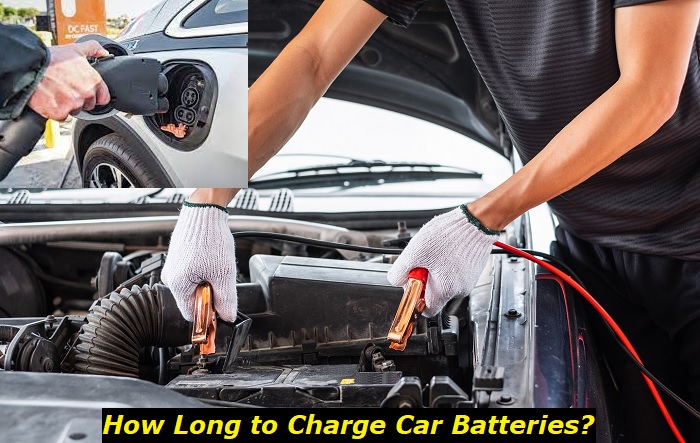Rechargeable batteries are an essential component of most vehicles. They're important in starting the engine and keeping the car's electrical systems running. Cars have different types of batteries, and they take different lengths of time to charge.
Car battery charging highlights
- Critical voltage:lower than 12 volts
- Target voltage:12.5 volts
- Charging voltage:14 - 14.7 volts
- Charging time:defined by tender
- Risks:battery death
- DIY solution:yes
- Tools needed:charger, power socket
- Price:$1

What Are the Factors that Affect How Long a Car Battery Takes to Charge?
Talking about how long the battery takes to charge is not as straightforward as it seems. There are many different factors that affect the rate of charge of your car's rechargeable battery. Here are the factors that affect how long your car battery will take to charge.
1) Battery Capacity
The capacity of your battery will affect how long it takes to charge. While bigger is better when talking about battery storage capacity, bigger also means longer charge times. This is because the battery needs to take in more electricity before it is completely charged.
Smaller batteries have faster charge times, but they don't run as long because they store less electricity.
2) State of Charge
The level of charge left in the battery when you charge it will determine how long you'll need to wait. A battery that is 60% charged will charge up much more quickly than one that's at 20% charge.
Generally, when discussing how long it takes to charge a battery, the figure that's given usually represents the time it takes for the battery to charge to 100% from 0%. In some cases, the figure represents the time to charge from 0% to 80%.
3) Charging Method
The charging method also plays a significant role in determining charging time. With both lead-acid car batteries and electric vehicle car batteries, there are different charging options that are available to you. These options differ in speed, so using the right charging option will make the main difference in how long you'll have to sit waiting for a full charge.
4) Age of the Battery
Batteries don't last forever. They age and become less efficient with time. As your car battery gets older, you will find that it takes longer to charge, and won't hold a charge effectively anymore.
Each type of battery has a specific lifespan after which it will need to be replaced.
For regular car batteries, the lifespan is typically five or six years. Most car owners will find that their batteries need to be replaced after about two or three years.
Electric vehicles have much more expensive batteries with longer lifespans. Depending on the make and model of your car, you can expect electric vehicle batteries to last 10-20 years.
How Long Do Lead-acid Car Batteries Take to Charge?
Lead-acid batteries are the main type of battery used in most cars. These 12-volt batteries power the starter motor, the ignition system, and the electronics in your car, allowing you to get your car started and enjoy the technology that comes with modern cars.
The average car battery has a capacity of 48-60 ampere-hours (Ah). The exact capacity will depend on the make and model of your car.
Car batteries with a higher capacity will be able to run for longer before draining completely, but they will also take longer to charge.
The most common method of charging a 12-volt battery in your car is with the alternator by running the engine. However, there are other methods of charging that will affect the length of the charging process.
Charging Methods
There are different methods of charging the lead-acid battery in your car. Each method has its particular strengths and will play a big part in how long it will take for the battery to charge.
- Alternator
The alternator is a part of the engine that converts the engine's motion into electrical energy to power the car's electrical systems when the engine is running. The alternator will also charge the battery. This makes it a simple method of charging without needing to remove the battery or use any special equipment.
Generally, the alternator will fully charge a car battery between 30 minutes and one hour when the car is driving. Charging takes longer when the engine is idling, taking around two hours for a full charge.
- Battery Charger
A battery charger allows you to plug your battery into a wall socket and have it recharge. There are different types of battery chargers. Generally, the fastest chargers can charge your car battery in as little as one hour, while the slowest chargers might take up to 12 hours.
Battery chargers run the risk of overcharging and damaging the battery. The battery's charge level needs to be monitored carefully while charging to prevent this from happening.
A special type of battery charger is the trickle charger. A trickle charger is considered one of the safest ways to charge a car battery, as it prevents overcharging.
A trickle charger works by charging the battery slowly over a long period of time, eliminating the risk of overcharging. Overcharging a lead-acid battery can damage the battery and shorten its lifespan.
Trickle chargers are not suitable for charging a dead battery because of how slowly they operate, but many car owners use them to prevent an unused battery from discharging.
How Long Do Lithium-ion Car Batteries Take to Charge?
Electric vehicles have become increasingly popular in recent years, with many drivers choosing to switch to electric power in an effort to reduce their carbon footprint and save on fuel costs.
However, one of the key concerns that many drivers have when considering electric vehicles is how long it takes to charge the car battery. Most drivers show concern at the idea of needing to sit at a charging station waiting for the battery to fill up, rather than filling a tank of gas and being back on the road in a few minutes.
Most electric vehicles will charge to 80% after about 30 minutes of charging. The exact time will vary depending on the make and model of the car, and the charging method that is used. There are other factors that also affect how quickly your electric vehicle will charge.
Electric vehicles need to carry a lot of charge. Their batteries need to carry enough charge to move the vehicle a considerable distance while producing suitable power output in the motor. For this reason, electric vehicles have batteries that dwarf the 12-volt lead-acid batteries used by gasoline cars.
The average EV battery has a capacity of 40kWH, with some going as high as 100kWH. As a general rule, the batteries with higher capacities will take longer to charge, but they will also have more range.
Charging Methods
There are three main methods of charging electric cars: Level 1 charging, Level 2 charging, and fast charging. While all electric vehicles are compatible with these chargers, they work at different speeds. They also have different applications depending on the situation and location.
- Level 1 Charging
Level 1 charging uses a standard 120-volt household outlet and is the slowest charging method, taking anywhere from 8 to 20 hours to fully charge an electric car battery, depending on the battery's size. This type of charger is typically set up in the home of the electric vehicle's owner, for the car to charge overnight.
- Level 2 Charging
Level 2 charging uses a 240-volt outlet and is faster, taking between 4 and 8 hours to fully charge a battery, depending on the battery's size. This can be installed at home and found in certain public locations.
- Fast Charging
Fast charging, also known as DC fast charging, uses a 480-volt outlet and is the fastest charging method, taking as little as 20 minutes to an hour to charge a battery to 80% capacity. This is found mainly at charging stations.
The Bottom Line
There are different types of car batteries and different methods of charging them. Regularly car batteries, also known as lead-acid batteries, can be charged using the alternator, or through a battery charger. An alternator will typically charge a battery in 30-60 minutes when the car is driving, or two hours when idle. Battery chargers tend to take several hours to fully charge the battery.
Electric vehicles use much larger batteries that need to hold enough charge to power the motor for many miles. The charging options are split into level 1, level 2, and fast charging. Level 1 chargers will take 8-20 hours to fully charge the battery. Fast chargers will charge the battery to 80% in half an hour.
About the authors
The CarAraC research team is composed of seasoned auto mechanics and automotive industry professionals, including individuals with advanced degrees and certifications in their field. Our team members boast prestigious credentials, reflecting their extensive knowledge and skills. These qualifications include: IMI: Institute of the Motor Industry, ASE-Certified Master Automobile Technicians; Coventry University, Graduate of MA in Automotive Journalism; Politecnico di Torino, Italy, MS Automotive Engineering; Ss. Cyril and Methodius University in Skopje, Mechanical University in Skopje; TOC Automotive College; DHA Suffa University, Department of Mechanical Engineering






Add comment